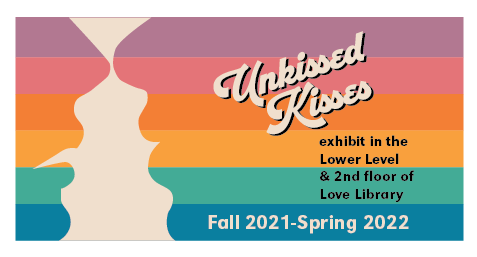
A new exhibit in Love Library highlights the historical moments of LGBTQ+ literature, writers, and their roles in the history of the University of Nebraska–Lincoln. The exhibit also celebrates the first LGBTQ course offered at a state university and taught by gay scholar, Louis Crompton, and is one event among a series of events to celebrate UNL’s support of LGBTQ studies. A collaborative project between Timothy Schaffert, Susan Rosowski Associate Professor of English and director of the Creative Writing Program; Erin Colonna, Graphic Designer, Libraries; Traci Robison, Assistant Professor of Practice and Outreach Archivist; and Andrew Jewell, Professor and Interim Chair of Digital Initiatives and Special Collections, the exhibit draws its title, “Unkissed Kisses,” from a poem by Oscar Wilde, who visited the University of Nebraska in 1882.
The exhibit will be open for the remainder of the fall through the spring semester and can be viewed in two locations within Love Library, in the lobby of the second floor and in display classes on the lower level of Love South.
Schaffert worked closely with Archives & Special Collections to feature interesting artifacts. Items on display range from a first edition of Oscar Wilde’s Ballad of Reading Gaol to Roxanne Gay’s masters thesis. Other highlights include an 1885 Houghton Mifflin edition of the Rubaiyat of Omar Khayamm illustrated by Elihu Vedder that Willa Cather inscribed as a gift to Louise Pound in June 1892 and a copy of Scrip with Allen Ginsberg’s poem, “Auto Poesy to Nebraska.” Ginsberg, who visited campus in 1966, brought his life partner and wrote the poem about his trip to Lincoln, which he shared at his presentation in the Union ballroom.
“Ginsberg talked about his sexuality and his opposition to the Vietnam War,” explained Schaffert, “these conversations reverberated and became part of the University’s conversations in the days after his visit.”
Schaffert and Robison created a digital supplement to the exhibit with additional information about featured topics and individuals that will be released soon. The digital component will also allow those who are not able to visit Love to learn from the exhibit.
Both Robison and Schaffert hope that students and scholars discover that there is indeed a rich history of LBGTQ literature at the University and will be inclined toward further research to discover more.